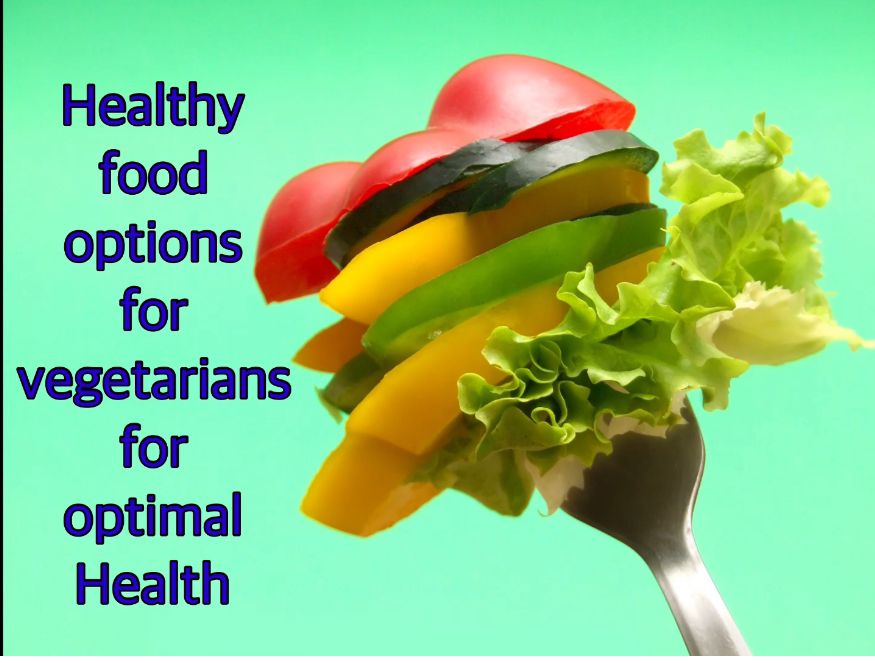
Healthy Food Options for Vegetarians: A Balanced and Nutritious Guide
Healthy Food Options for Vegetarians: A Balanced and Nutritious Guide
In today's health-conscious world, more and more people are choosing a vegetarian lifestyle for a variety of reasons, including health, ethical concerns, and environmental sustainability. Whether you're a seasoned vegetarian or just transitioning, it's important to ensure your diet is well-balanced, nutritious, and delicious. Here’s a comprehensive guide to healthy food options for vegetarians that provide essential nutrients while satisfying your taste buds.
1. Fruits and Vegetables: The Foundation of a Healthy Diet
Fruits and vegetables are staples in a vegetarian diet, providing essential vitamins, minerals, and antioxidants. These foods are naturally low in calories and high in fiber, making them great for maintaining a healthy weight and promoting overall health.
- Leafy greens such as spinach, kale, and Swiss chard are rich in iron, calcium, and vitamins A, C, and K. Including these in your daily diet can boost bone health and enhance your immune system.
- Cruciferous vegetables like broccoli, cauliflower, and Brussels sprouts offer potent antioxidants that help reduce the risk of chronic diseases.
- Colorful fruits like berries, oranges, apples, and bananas are loaded with vitamins, especially vitamin C, which is important for skin health, immune support, and iron absorption.
2. Legumes: The Protein Powerhouse
Protein is often a concern for vegetarians, but legumes provide an excellent plant-based protein source. They are also packed with fiber, which promotes digestive health and keeps you feeling full for longer.
- Lentils, chickpeas, black beans, and kidney beans are versatile ingredients that can be added to soups, salads, stews, and curries. They provide protein, iron, and zinc, all of which are important for energy and muscle health.
- Soy products like tofu, tempeh, and edamame are complete proteins, meaning they contain all nine essential amino acids. These can be used as a meat substitute in stir-fries, sandwiches, or salads.
3. Whole Grains: Sustained Energy
Whole grains are an excellent source of complex carbohydrates, which provide long-lasting energy. Unlike refined grains, whole grains retain their fiber, B vitamins, and essential minerals like magnesium and selenium.
- Quinoa, brown rice, barley, and oats are great options to include in your vegetarian diet. Quinoa is particularly beneficial because it’s a complete protein and gluten-free, making it a great choice for those with gluten sensitivities.
- Whole grain bread, pasta, and cereals offer a heart-healthy alternative to their refined counterparts and can help maintain healthy blood sugar levels.
4. Nuts and Seeds: Nutrient-Dense Snacks
Nuts and seeds are not only great for snacking but also provide healthy fats, protein, fiber, and a variety of vitamins and minerals.
- Almonds, walnuts, chia seeds, and flaxseeds are particularly high in omega-3 fatty acids, which are essential for brain health and reducing inflammation.
- Pumpkin seeds and sunflower seeds are rich in magnesium and zinc, which help support immune function and heart health.
- Try adding nuts and seeds to salads, yogurt, or smoothies for an extra nutrient boost.
5. Dairy or Dairy Alternatives: Calcium and Vitamin D
For those who consume dairy, it’s an excellent source of calcium, vitamin D, and protein. However, if you're vegan or lactose intolerant, there are plenty of plant-based alternatives that are fortified with these essential nutrients.
- Low-fat dairy options like milk, yogurt, and cheese can provide a quick source of calcium and vitamin D, which are important for bone health.
- Fortified plant-based milks like almond, soy, or oat milk offer a dairy-free alternative. Make sure to choose options that are fortified with calcium and vitamin D to ensure you’re meeting your nutritional needs.
6. Eggs: A Versatile Protein Option
For lacto-ovo vegetarians, eggs are an excellent source of high-quality protein and essential nutrients like vitamin B12 and choline. Eggs are also incredibly versatile and can be incorporated into breakfast dishes, salads, or sandwiches.
- Boiled eggs, scrambled eggs, or omelets make a quick and nutritious meal that provides protein, healthy fats, and essential vitamins.
- For a heart-healthy option, consider using only egg whites or opting for an egg substitute if cholesterol is a concern.
7. Fermented Foods: Gut Health Boosters
Fermented foods are beneficial for maintaining a healthy gut microbiome, which is crucial for digestion and overall health. They are rich in probiotics, which are live bacteria that promote a healthy balance of gut flora.
- Yogurt, kefir, and miso are excellent sources of probiotics. For a dairy-free option, opt for coconut or almond yogurt that contains live active cultures.
- Kimchi, sauerkraut, and kombucha also offer a rich source of probiotics and can add a flavorful twist to your meals.
8. Supplements: Filling in the Gaps
While a well-planned vegetarian diet can meet most of your nutritional needs, some nutrients may be harder to get, especially for vegans. It’s important to pay attention to vitamin B12, iron, and omega-3 fatty acids, as these are often lacking in plant-based diets.
- Vitamin B12 is found naturally in animal products, so vegans should consider a B12 supplement or consume fortified foods like plant-based milks and cereals.
- Iron supplements or iron-rich plant foods, such as lentils, spinach, and fortified grains, should be consumed with vitamin C-rich foods to enhance absorption.
- Omega-3 supplements derived from algae can help ensure you're getting adequate amounts of essential fatty acids.
Conclusion
A vegetarian diet can be both healthy and satisfying when it's well-planned. By including a variety of fruits, vegetables, whole grains, legumes, nuts, seeds, and, if desired, dairy or eggs, you can meet all your nutritional needs while enjoying a diverse and flavorful diet. Make sure to stay mindful of key nutrients like protein, iron, calcium, and vitamin B12 to ensure you’re maintaining a balanced and nutrient-rich vegetarian lifestyle.

